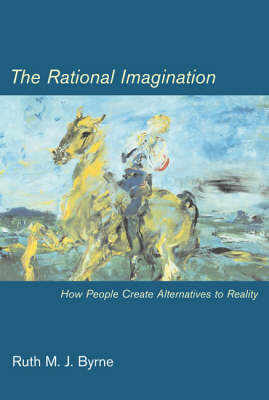
The Rational Imagination
How People Create Alternatives to Reality
Seiten
2005
Bradford Books (Verlag)
978-0-262-02584-3 (ISBN)
Bradford Books (Verlag)
978-0-262-02584-3 (ISBN)
- Titel ist leider vergriffen;
keine Neuauflage - Artikel merken
A leading scholar in the psychology of thinking and reasoning argues that the counterfactual imagination--the creation of "if only" alternatives to reality--is guided by the same principles that underlie rational thought.
The human imagination remains one of the last uncharted terrains of the mind. This accessible and original monograph explores a central aspect of the imagination, the creation of counterfactual alternatives to reality, and claims that imaginative thoughts are guided by the same principles that underlie rational thoughts. Research has shown that rational thought is more imaginative than cognitive scientists had supposed; in The Rational Imagination, Ruth Byrne argues that imaginative thought is more rational than scientists have imagined.
People often create alternatives to reality and imagine how events might have turned out "if only" something had been different. Byrne explores the "fault lines" of reality, the aspects of reality that are more readily changed in imaginative thoughts. She finds that our tendencies to imagine alternatives to actions, controllable events, socially unacceptable actions, causal and enabling relations, and events that come last in a temporal sequence provide clues to the cognitive processes upon which the counterfactual imagination depends. The explanation of these processes, Byrne argues, rests on the idea that imaginative thought and rational thought have much in common.
The human imagination remains one of the last uncharted terrains of the mind. This accessible and original monograph explores a central aspect of the imagination, the creation of counterfactual alternatives to reality, and claims that imaginative thoughts are guided by the same principles that underlie rational thoughts. Research has shown that rational thought is more imaginative than cognitive scientists had supposed; in The Rational Imagination, Ruth Byrne argues that imaginative thought is more rational than scientists have imagined.
People often create alternatives to reality and imagine how events might have turned out "if only" something had been different. Byrne explores the "fault lines" of reality, the aspects of reality that are more readily changed in imaginative thoughts. She finds that our tendencies to imagine alternatives to actions, controllable events, socially unacceptable actions, causal and enabling relations, and events that come last in a temporal sequence provide clues to the cognitive processes upon which the counterfactual imagination depends. The explanation of these processes, Byrne argues, rests on the idea that imaginative thought and rational thought have much in common.
Professor Ruth M.J. Byrne is Vice Provost of Trinity College, Dublin University, Ireland.
| Reihe/Serie | The Rational Imagination |
|---|---|
| Zusatzinfo | 4 illus. |
| Verlagsort | Massachusetts |
| Sprache | englisch |
| Maße | 152 x 229 mm |
| Gewicht | 499 g |
| Themenwelt | Geisteswissenschaften ► Psychologie ► Allgemeine Psychologie |
| Geisteswissenschaften ► Psychologie ► Verhaltenstherapie | |
| ISBN-10 | 0-262-02584-1 / 0262025841 |
| ISBN-13 | 978-0-262-02584-3 / 9780262025843 |
| Zustand | Neuware |
| Informationen gemäß Produktsicherheitsverordnung (GPSR) | |
| Haben Sie eine Frage zum Produkt? |
Mehr entdecken
aus dem Bereich
aus dem Bereich
Techniken der Verhaltenstherapie
Buch (2024)
Julius Beltz GmbH & Co. KG (Verlag)
35,00 €


